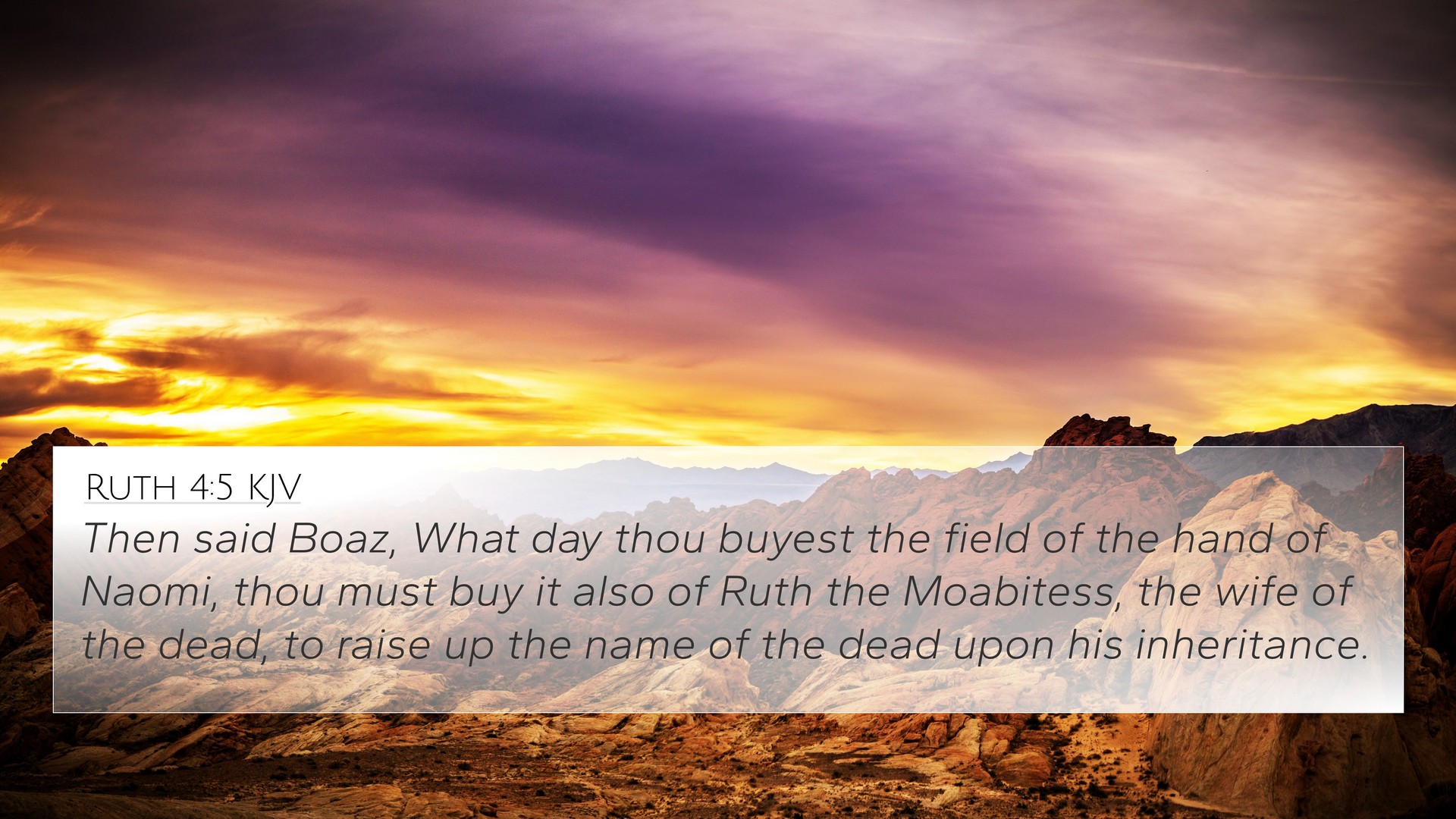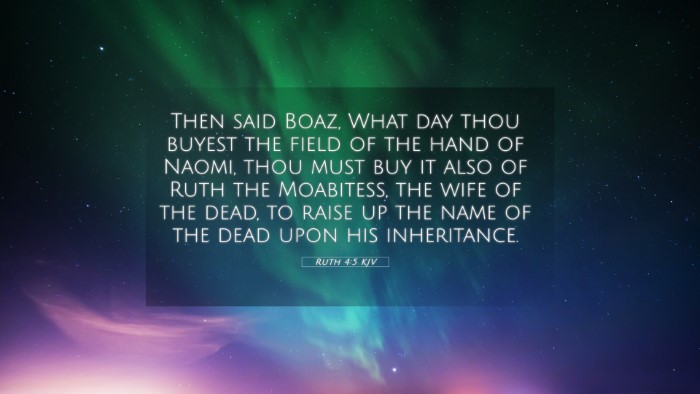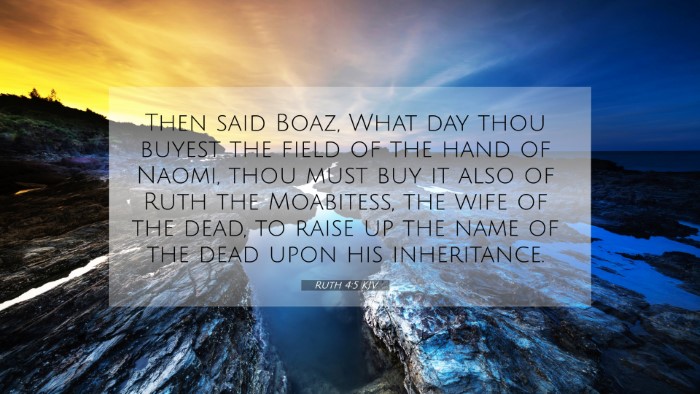Old Testament
Genesis Exodus Leviticus Numbers Deuteronomy Joshua Judges Ruth 1 Samuel 2 Samuel 1 Kings 2 Kings 1 Chronicles 2 Chronicles Ezra Nehemiah Esther Job Psalms Proverbs Ecclesiastes Song of Solomon Isaiah Jeremiah Lamentations Ezekiel Daniel Hosea Joel Amos Obadiah Jonah Micah Nahum Habakkuk Zephaniah Haggai Zechariah MalachiRuth 4:5 Similar Verses
Ruth 4:5 Cross References
Then said Boaz, What day thou buyest the field of the hand of Naomi, thou must buy it also of Ruth the Moabitess, the wife of the dead, to raise up the name of the dead upon his inheritance.
Uncover the Rich Themes and Topics of This Bible Verse
Listed below are the Bible themes associated with Ruth 4:5. We invite you to explore each theme to gain deeper insights into the Scriptures.
Ruth 4:5 Cross Reference Verses
This section features a detailed cross-reference designed to enrich your understanding of the Scriptures. Below, you will find carefully selected verses that echo the themes and teachings related to Ruth 4:5 KJV. Click on any image to explore detailed analyses of related Bible verses and uncover deeper theological insights.
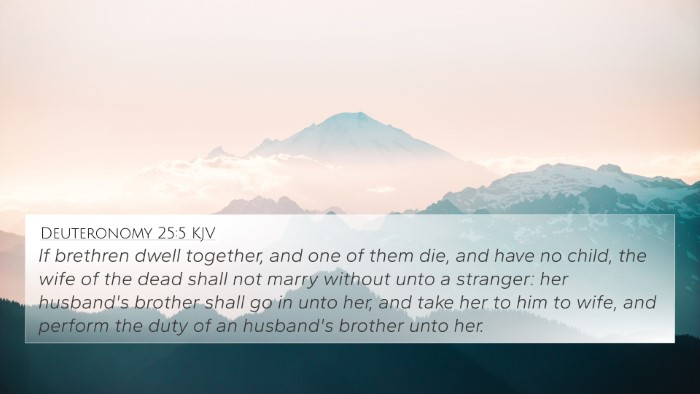
Deuteronomy 25:5 (KJV) »
If brethren dwell together, and one of them die, and have no child, the wife of the dead shall not marry without unto a stranger: her husband's brother shall go in unto her, and take her to him to wife, and perform the duty of an husband's brother unto her.
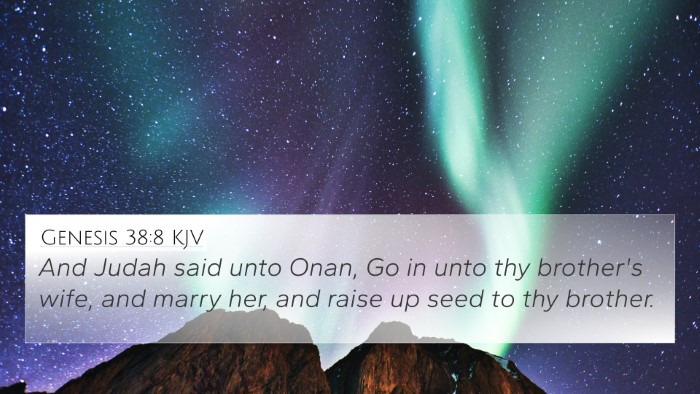
Genesis 38:8 (KJV) »
And Judah said unto Onan, Go in unto thy brother's wife, and marry her, and raise up seed to thy brother.
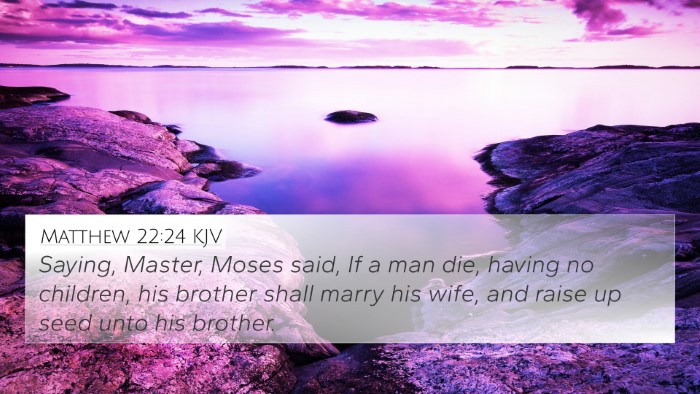
Matthew 22:24 (KJV) »
Saying, Master, Moses said, If a man die, having no children, his brother shall marry his wife, and raise up seed unto his brother.
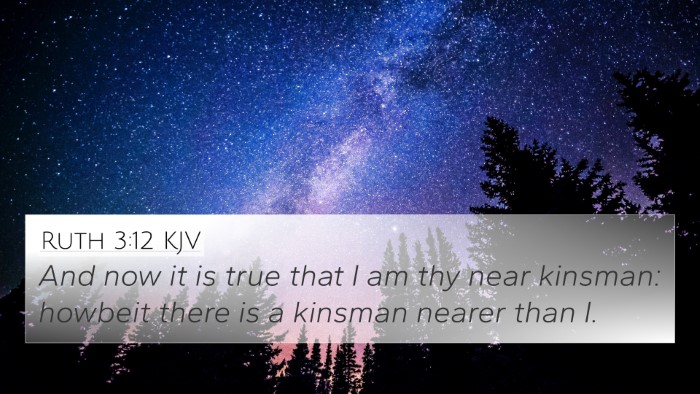
Ruth 3:12 (KJV) »
And now it is true that I am thy near kinsman: howbeit there is a kinsman nearer than I.
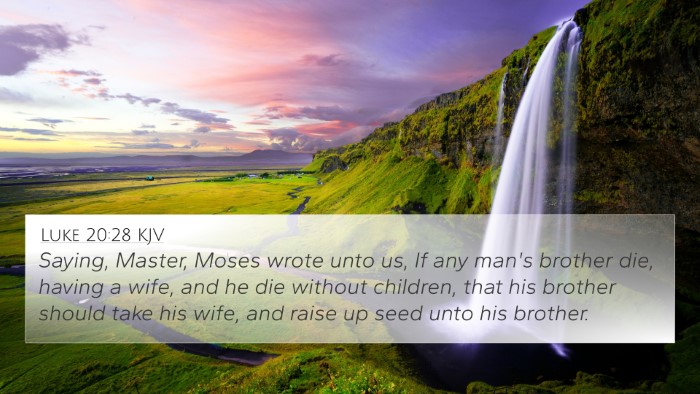
Luke 20:28 (KJV) »
Saying, Master, Moses wrote unto us, If any man's brother die, having a wife, and he die without children, that his brother should take his wife, and raise up seed unto his brother.
Ruth 4:5 Verse Analysis and Similar Verses
Understanding Ruth 4:5
Ruth 4:5 states: “Then said Boaz, What day thou buyest the field of the hand of Naomi, thou must buy it also of Ruth the Moabitess, the wife of the dead, to raise up the name of the dead upon his inheritance.”
This verse occurs at a pivotal moment in the Book of Ruth, revealing the significance of the leverate marriage customs established in Israelite law. Boaz, a kinsman-redeemer, outlines the responsibilities attached to the purchase of Naomi's land, demonstrating his commitment to continuing the lineage of Ruth's deceased husband, Mahlon.
Key Themes and Interpretations:
- Redemption: This verse establishes Boaz’s role as a redeemer, emphasizing the cultural importance of maintaining family lineage and property through marriage.
- Restoration of Heritage: Boaz's actions are framed within the broader narrative of restoring Naomi and her family's name, underscoring the theme of restoration that permeates the book.
- Divine Providence: The context suggests God's providential care in bringing Ruth and Boaz together, which fulfills a divine purpose of the Israelite people.
- Inclusivity of Gentiles: By noting Ruth's Moabitess origin, the verse highlights God's inclusion of Gentiles into His redemptive plan, particularly through the lineage of David.
Cross-References:
- Deuteronomy 25:5-10: This passage outlines the laws concerning the levirate marriage tradition, providing the foundational context for Boaz's statement in Ruth 4:5.
- Matthew 1:5: Ruth is mentioned in the genealogy of Jesus Christ, demonstrating her vital role in God’s redemptive history.
- Isaiah 56:6-8: These verses affirm God’s acceptance of the foreigner and eunuch, which resonates with Ruth’s story and God's inclusive covenant.
- Psalms 113:9: This psalm reflects God’s blessing of the barren women, paralleling the blessings upon Ruth through Boaz's commitment.
- John 4:9: The mention of the Samaritan woman illustrates inter-Biblical dialogue, emphasizing the significance of cross-cultural relationships in God's plan.
- Galatians 3:28: Here, Paul speaks on the equality found in Christ, resonating with the acceptance of Ruth as part of God’s family despite her lineage.
- Hebrews 11:4: This verse refers to the faith of Abel, but it also encompasses the notion of faithfulness to God's commandments, seen in Boaz's actions.
- Luke 20:34-36: In this discourse, Jesus addresses the resurrection, which complements the idea of preserving a family name, as invoked by Boaz's duty.
- 1 Timothy 5:8: This emphasizes the importance of providing for one's family, which links to Boaz’s commitment to both Ruth and Naomi.
- Philippians 2:5-11: This passages on servitude mirrors Boaz’s humility and willingness to sacrifice his own interests for the benefit of Ruth and Naomi.
Conclusion:
In summary, Ruth 4:5 encapsulates critical themes of redemption, family loyalty, and God's providence, with inter-Biblical connections emphasizing the significance of these concepts throughout the Scriptures. As believers study this verse, they gain deeper insights not only into the narrative of Ruth and Boaz but also into the overarching message of God’s redemptive plan for all humanity.
